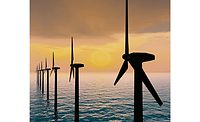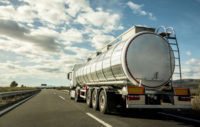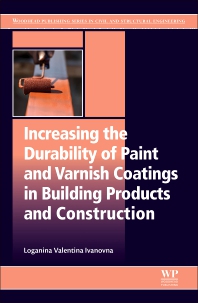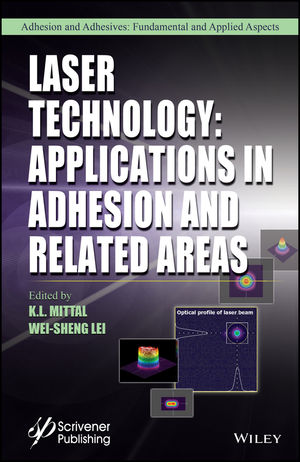Cortec Coatings Outperform Competition in NASA Research Project
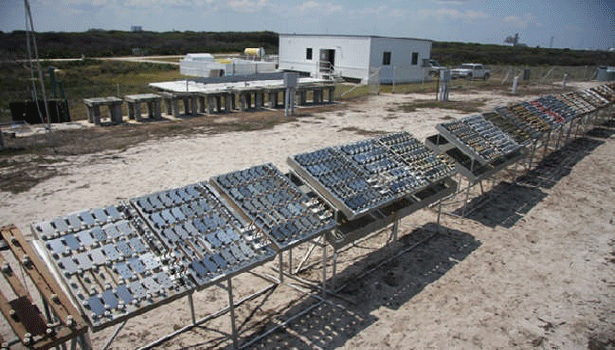
Location of the beachside corrosion test site at Kennedy Space Center, Florida along the Atlantic Ocean (left) and panels after initial CPC application and exposed to the marine atmosphere at the test site (right).

CPC-coated Carbon Steel Panel from Initial Exposure through 6 Months, No 10 showing VpCI 368

Examples of pitting results for long-term atmospheric exposure of CPCcoated UNS A92219: control (left) and Cortec’s VpCI 368 (right).

Examples of crevice corrosion for atmospheric exposure of CPC-coated stainless steel (left -control and right - Cortec's EcoLine 3690)




NASA conducted tests of corrosion preventive compounds in a study titled “The Behavior of Environmentally Friendly Corrosion Preventative Compounds in an Aggressive Coastal Marine Environment.” The tests were conducted at NASA’s atmospheric test station at the Kennedy Space Center in Florida. This is known as one of the most corrosive areas in the United States and one of the most corrosive places in the world because of its hot climate, proximity to the Atlantic Ocean, winds carrying salt spray and fallout of rocket propellants that are highly corrosive.
Kennedy Space Center is located within the Merritt Island National Wildlife Refuge, which makes environmentally friendly alternatives highly sought after. The shift to use environmentally friendly technologies throughout future space-related launch programs prompted a study aimed at replacing current petroleum and solvent-based corrosion-preventive compounds with safer alternatives.
This research focused on identification and evaluation of environmentally friendly CPCs for use in protecting flight hardware and ground support equipment from atmospheric corrosion. The corrosion preventive compounds needed to survive in the aggressive coastal space center.
The objective was to determine if environment-friendly CPCs will provide adequate corrosion protection for spaceport structures and related hardware used at NASA’s center considering the large number of environmental and safety issues associated with conventional CPCs. Petroleum-based CPCs have become increasingly impractical for use at this location due to environmental concerns and cumbersome containment procedures required during application and removal.
Three products from Cortec, VpCI 368, EcoLine® 3690, and EcoLine HD Grease, were tested along with 12 others. The Cortec products showed outstanding results.
The different protection behaviors of 15 different soft film CPCs, both common petroleum-based and newer environmentally friendly types, were evaluated on various steel and aluminum substrates. The CPC and substrate systems were subjected to atmospheric testing at the test site located in Kennedy Space Center as well as cyclic accelerated corrosion testing. Each CPC also underwent physical characterization and launch-related compatibility testing.
CPC applications of interest include spaceport ground support equipment, aircraft applications, marine applications, ground operations applications and launch applications.
The summary of current results and analysis performed by NASA showed that of all the CPCs tested Cortec's inhibitors exhibited the least amount of both crevice and galvanic corrosion and penetrated successfully under the fastener. They also provided good protection considering the long atmospheric exposure time. VpCI 368 was the only inhibitor tested to resist corrosion for of all of the aluminum alloys.
VpCI 368 is a time-proven coating that provides excellent protection to metal substrates exposed to harsh outdoor conditions.
EcoLine 3690 is a bio-based/bio-degradable ready-to-use temporary coating designed for severe marine and high humidity conditions. The product is non-hazardous, non-toxic, and good for sensitive areas where environmentally friendly alternatives are desired. It provides excellent outdoor protection on any metal surface. The film is self-healing and moisture displacing, providing superior protection against aggressive environments.
EcoLine HD Grease is a bio-based/bio-degradable heavy-duty grease formulated with natural seed oil that surpasses the lubricity of most conventional petroleum-based greases. Utilizing the latest biotechnology, it is an environmentally friendly replacement for harmful greases.
Reference:
E.L. Montgomerry, Kennedy Space Center, L.M. Calle, NASA: "The Behavior of Environmentally Friendly Corrosion Preventive Compounds in an Aggressive Marine Environment", Paper # 2720, Corrosion 2013, NACE.
Looking for a reprint of this article?
From high-res PDFs to custom plaques, order your copy today!




